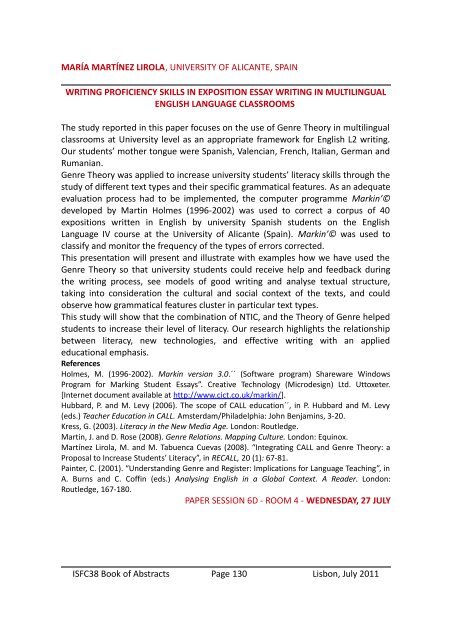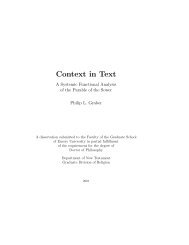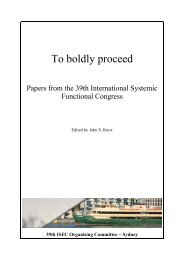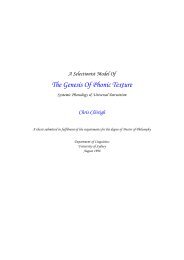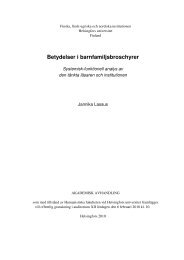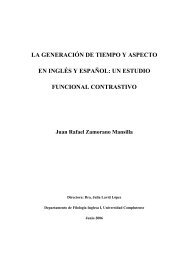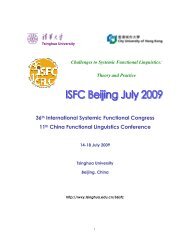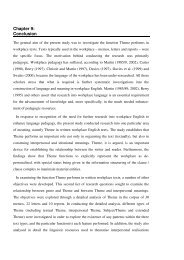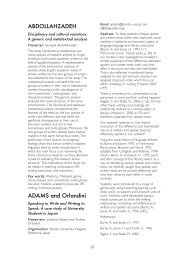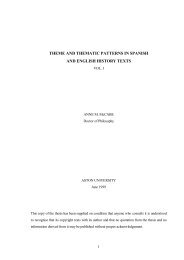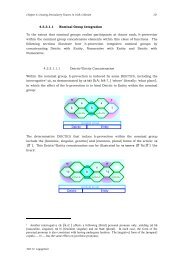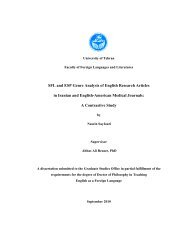Abstracts - Faculdade de Letras da Universidade de Lisboa
Abstracts - Faculdade de Letras da Universidade de Lisboa
Abstracts - Faculdade de Letras da Universidade de Lisboa
- No tags were found...
Create successful ePaper yourself
Turn your PDF publications into a flip-book with our unique Google optimized e-Paper software.
MARÍA MARTÍNEZ LIROLA, UNIVERSITY OF ALICANTE, SPAINWRITING PROFICIENCY SKILLS IN EXPOSITION ESSAY WRITING IN MULTILINGUALENGLISH LANGUAGE CLASSROOMSThe study reported in this paper focuses on the use of Genre Theory in multilingualclassrooms at University level as an appropriate framework for English L2 writing.Our stu<strong>de</strong>nts’ mother tongue were Spanish, Valencian, French, Italian, German andRumanian.Genre Theory was applied to increase university stu<strong>de</strong>nts’ literacy skills through thestudy of different text types and their specific grammatical features. As an a<strong>de</strong>quateevaluation process had to be implemented, the computer programme Markin’©<strong>de</strong>veloped by Martin Holmes (1996-2002) was used to correct a corpus of 40expositions written in English by university Spanish stu<strong>de</strong>nts on the EnglishLanguage IV course at the University of Alicante (Spain). Markin’© was used toclassify and monitor the frequency of the types of errors corrected.This presentation will present and illustrate with examples how we have used theGenre Theory so that university stu<strong>de</strong>nts could receive help and feedback duringthe writing process, see mo<strong>de</strong>ls of good writing and analyse textual structure,taking into consi<strong>de</strong>ration the cultural and social context of the texts, and couldobserve how grammatical features cluster in particular text types.This study will show that the combination of NTIC, and the Theory of Genre helpedstu<strong>de</strong>nts to increase their level of literacy. Our research highlights the relationshipbetween literacy, new technologies, and effective writing with an applie<strong>de</strong>ducational emphasis.ReferencesHolmes, M. (1996-2002). Markin version 3.0.´´ (Software program) Shareware WindowsProgram for Marking Stu<strong>de</strong>nt Essays”. Creative Technology (Micro<strong>de</strong>sign) Ltd. Uttoxeter.[Internet document available at http://www.cict.co.uk/markin/].Hubbard, P. and M. Levy (2006). The scope of CALL education´´, in P. Hubbard and M. Levy(eds.) Teacher Education in CALL. Amster<strong>da</strong>m/Phila<strong>de</strong>lphia: John Benjamins, 3-20.Kress, G. (2003). Literacy in the New Media Age. London: Routledge.Martin, J. and D. Rose (2008). Genre Relations. Mapping Culture. London: Equinox.Martínez Lirola, M. and M. Tabuenca Cuevas (2008). “Integrating CALL and Genre Theory: aProposal to Increase Stu<strong>de</strong>nts’ Literacy”, in RECALL, 20 (1): 67-81.Painter, C. (2001). “Un<strong>de</strong>rstanding Genre and Register: Implications for Language Teaching”, inA. Burns and C. Coffin (eds.) Analysing English in a Global Context. A Rea<strong>de</strong>r. London:Routledge, 167-180.PAPER SESSION 6D - ROOM 4 - WEDNESDAY, 27 JULYISFC38 Book of <strong>Abstracts</strong> Page 130 Lisbon, July 2011


